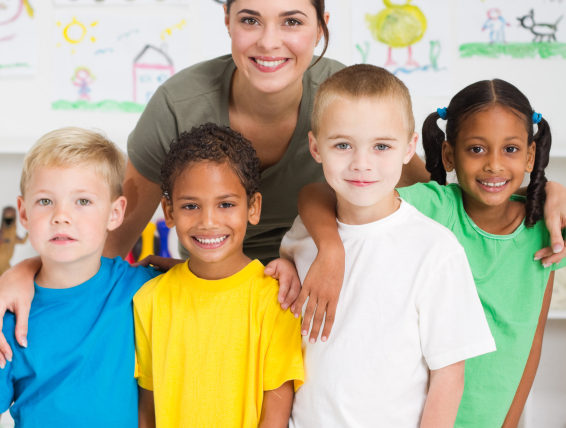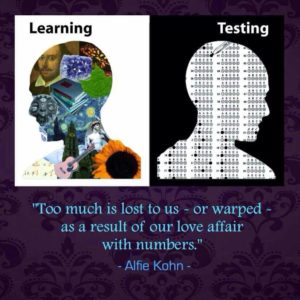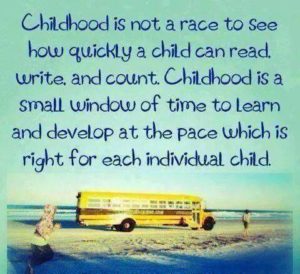
A lot of people move to our neighborhood for the schools, so it may seem odd that I’ve spent the last months agonizing over where to send  my son for kindergarten. Heck, even we moved here for the schools. Then my first baby grew up a little, and I started learning more about parenting and schooling – and I changed, a total 180 from where I thought I’d be now. I slowly became an “unconventional parent.”
my son for kindergarten. Heck, even we moved here for the schools. Then my first baby grew up a little, and I started learning more about parenting and schooling – and I changed, a total 180 from where I thought I’d be now. I slowly became an “unconventional parent.”
Our schools are the “best” in the county, and by “best” I mean they have the highest test scores, the toughest academic standards, and the greatest percentage of college graduates. The problem is that I don’t care about any of that anymore. I don’t believe test scores measure real learning; I believe they cause unnecessary anxiety in children. I believe children learn best through play, exploration collaboration, and readiness. Children are built to learn and we simply need to follow their cues and support them. As Magda Gerber said, “Be careful what you teach, it might interfere with what they are learning.” I was worried that our public school would squash my son’s love of learning through premature academics, lack of play, and a forced system of rewards and behavior modification. I was worried the lack of play would rob him of his childhood. But rather than jumping to conclusions, I decided to research our options with a little more of an open mind.
The fact is there is no objective way to measure something as subjective, as deeply personal as an individual child’s learning. – Laura Grace Weldon, Free Range Learning
I LISTENED TO TEACHERS
I spoke with a few teacher friends, some mainstream and some alternative. Each of them had both good and bad points to share about the systems they teach in. I began to see that, like jobs for grownups, no school is free of problems; they each have their own brand of issues. Nothing is perfect.
One friend, who teaches at our local public school, came over for drinks one night and gave me the down and dirty on the school. I told her my fears, and she gave me her best interpretation of how the school would handle it. She myth-busted all my fears and – epiphany! These fears were not coming from school at all, but from parents. I was listening to the wrong people! She told me that the first half of kindergarten was about getting used to being in a classroom, with no homework, and that homework in the second half of the year was minimal. If a child couldn’t finish the homework, the family could talk to the teacher and sort it out. It’s not a big deal; it’s low pressure. While they do use a red, yellow, green card behavior management system, it is generally discreet, and is posted in the back corner of the classroom. Recess was long enough and was never withdrawn as punishment, because kids need to move. Basically, my friend systematically resolved every single issue I was worried about.
I STOPPED LISTENING TO OTHER PARENTS
I realized I was buying into the hype—the hype in favor of academics, pressure, and performance. I thought I was actively ignoring this but I wasn’t. I was assuming that these parents were high pressure as a result of the schools— that the schools set these high standards and parents followed suit. I heard many, many parents talking about how they prep their kids for kindergarten—how preschool just isn’t enoug h, so you have to work on academics at home. They talked about college and high school at preschool birthday parties; they asked if my 3 year old could write yet, and how high he could count. The academic chatter was non-stop.
h, so you have to work on academics at home. They talked about college and high school at preschool birthday parties; they asked if my 3 year old could write yet, and how high he could count. The academic chatter was non-stop.
On a rational level, I understood that this was just the culture here and I was free to ignore it and parent according to my own ideas, but it still managed to plant a seed of fear in me. It made me think public school might not be good enough for my kid (for reasons that were alien to most). I worried it would crush his spirit and deflate his confidence, but once I had done all my research, I realized that this hyper-academic attitude was about the parents and the wider culture, not the school. Relieved, I began to open my mind to the possibility of public school. Most importantly, I started walking away from conversations that I knew were not healthy for me to hear.
As a blogger, I also have a strong online community, where there is a lot of chatter about how horrible public school is. The parents I know online—who include homeschoolers and unschoolers—worry that public school discourages real learning in exchange for rote memorization, destroys intrinsic motivation, causes anxiety, makes children perform to adult standards, lacks empathy for normal developmental behavior, provides pointless homework, and is outdated in its way of thinking. But I realized that I needed to stop letting these broad fears get to me, and instead focus on our specific case.
I VISITED SCHOOLS
I met with the public school principal, toured the kindergarten classroom, and talked with two kindergarten teachers. The principal listened to my concerns and made suggestions about how our family could be successful there. It was clear that she knew what she was doing, and that the teachers understood children and had reasonable expectations for them. We went to an orientation and a campus tour, and none of it stood out as horrifying as I had feared public school would be.

The charter school visit was a little more interesting because I’d wanted to like it so badly. I’d gone to info night, and then to an open house and we looked in each classroom. On paper, this school looked perfect. It used Positive Discipline (à la Jane Nelson) and had a project-based curriculum; conflicts were resolved through meetings between classmates, not punishment, time-out or behavior charts. Children were involved in setting class rules and designing their classroom. Older kids were learning math by building things like skateboard ramps. They were given a voice in their own learning and encouraged to discover their individual talent; in addition to the academic curriculum, they had a social-emotional curriculum. Did you hear that? A SOCIAL-EMOTIONAL CURRICULUM! You can see why I was excited.
But, at the open house, I began to pick up clues that perhaps they weren’t quite finished perfecting their implementation. In particular, one of the most misunderstood parts of Positive Discipline or any respectful style of parenting is the importance of enforcing limits and boundaries, and I sensed that they might not have that down yet.
The final test was when I visited the kindergarten classroom and sat in on their 45-minute “Morning Meeting” which ended up being more of a circle time than the student led meeting that Positive Discipline touts. The week’s topic was countries, and circle time was about customs in Ireland. After about 20 minutes, the kids started squirming; the teacher kindly and lovingly helped them back to their seats, but it kept happening. She continued to talk about how to shake hands in Ireland (which is exactly the same as in the U.S.). The kids were getting bored. I was getting bored. I expected her to get them up, moving, and shaking hands with each other, or maybe to teach something more interesting than a handshake—like dancing a jig and playing Irish music! She even had to refer to Wikipedia on her iPhone.
The main lesson for me was that she didn’t get it. Forty-five minutes is about 25 minutes longer than kindergarteners are capable of sitting still. She could respectfully redirect all day long, but they just weren’t capable. She wasn’t reading the kids’ cues and didn’t understand that it was time to end the meeting and move on. This small snapshot, while perhaps not representative of the entire day, gave me mounds of information. It reinforced my belief that no school would be perfect.
I TRUSTED MYSELF AND MY FAMILY
To make my final decision, I had to trust myself more. I am raising a good kid—a boy who is empathetic, who stands up for himself, and who trusts me enough to share his problems with me. If things aren’t going well for him, he will tell me, and I can and will help him work through it; I am capable of that. I will always do that, just like I did with the sweatshirt incident in my last post, I will help him. I trust him, I trust myself, and I trust my husband. I am sure that, even though no school is perfect, this team will succeed.
I DECIDED
Ultimately, I chose the school that had the most benefits for our family: the public one. This was not the school that, on paper, most clo sely aligned with our point of view. I would definitely have chosen the path of least resistance—the school that would offer the most seamless fit for my educational philosophy and for my son—IF it had been well executed. But I couldn’t find such a school, within reasonable distance, that shouted out to me, This is the ONE.
sely aligned with our point of view. I would definitely have chosen the path of least resistance—the school that would offer the most seamless fit for my educational philosophy and for my son—IF it had been well executed. But I couldn’t find such a school, within reasonable distance, that shouted out to me, This is the ONE.
I began to think: if all of us who want schools to be more progressive leave the public school system, the chances of schools actually becoming more progressive are slim. Of course, when it’s your kid, theoretical and philanthropic ideas about the greater good seem irrelevant. No one wants to sacrifice their own kid’s education or well being for the greater good. But since the charter school had it’s own issues, my idea about the path of least resistance wasn’t realistic. There was no perfect school for us. So I figured, I may as well do my work of advocating for my child within the public school system.
The sense of community also drew me to the public school. The school is close to our house—we can just about walk. The neighborhood kids go there, and that sense of community is an important part of childhood to us. I won’t have to spend a chunk of my day in the car, and really, that does matter. I can easily volunteer in the classroom. The administrators listened to me during my decision making process and placed him in a classroom with a good fit for his personality, they made helpful suggestions, and they thoughtfully put all of the kids from his preschool in the same class to ease the transition. They held a “Meet and Greet” a few days before school started, to get the kids and teacher acquainted. The teacher read them a book about kindergarten and did a scavenger hunt to familiarize them with the room. They took time and energy to get to know the children’s families. So, even if the teachers and administrators use some practices that don’t sit well with me, I know they have good intentions, and I trust that they will continue to listen to my perspective. And, who knows, maybe my unconventional ways will interest someone else. Maybe I’ll make a difference. One never can tell.
EDITED: Unfortunately, we ended up pulling our son out of this school mid-year. I write about that in the below links:
Dear Public School: It’s Not Me It’s You
Choosing a School: The Not So Obvious Questions You Need to Ask
Other Good Reads:
Mis Night’s Marbles: Chuck the Chart Series
Huffington Post: Why I Send My Child to Public Schools
Scholastic.com – What Happened to Kindergarten?
Mama Eve- My Lesson In Public School


Leave a Reply